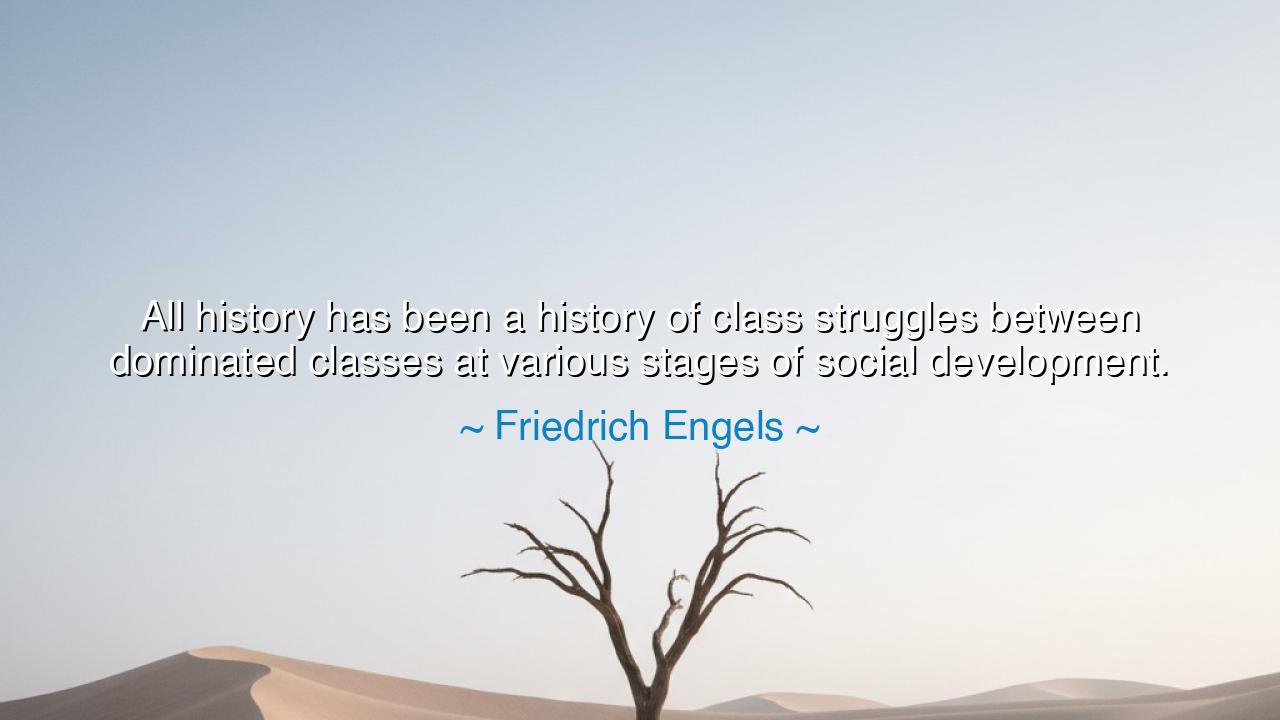
All history has been a history of class struggles between
All history has been a history of class struggles between dominated classes at various stages of social development.






The philosopher and revolutionary Friedrich Engels, companion of Karl Marx and co-author of The Communist Manifesto, once declared: “All history has been a history of class struggles between dominated classes at various stages of social development.” In this profound statement, he unmasked one of the oldest and fiercest forces in human civilization — the struggle between those who possess power and those who labor beneath it. His words are not merely an observation of economics or politics, but a revelation of the human condition itself: that the heartbeat of history is conflict — conflict born not from hatred, but from inequality, from the eternal longing of the oppressed to be free.
To understand the origin of this quote, we must step into the 19th century, a time of smoke and steel, when the furnaces of the Industrial Revolution blazed across Europe. The few owned the machines, the land, and the wealth; the many owned only their strength. Children worked in dark factories; men and women toiled twelve hours for a pittance. Engels, the son of a wealthy textile manufacturer, walked among the workers of Manchester and saw their suffering. He saw the division of classes — the masters who ruled and the laborers who served — and in that division, he recognized the pattern that stretched backward through the ages. From the slaves of Rome to the serfs of feudal Europe, from the peasants of China to the wage-workers of modern cities, humanity has lived in chains forged by its own social order.
Engels’ insight was that class struggle is not an accident of history — it is history. Every age has been marked by the same drama in different costume. When the pharaohs of Egypt commanded their monuments to rise, thousands of nameless hands laid the stones. When the lords of the Middle Ages built their castles, they did so upon the backs of peasants bound to the land. And when the merchants and industrialists of modern times claimed their fortunes, they did so through the sweat of those who worked unseen. The stage changes, the names differ, but the story remains: the few rule, the many endure, until the balance breaks, and the world is remade once more.
Consider the story of the French Revolution, when the common people — weary of hunger, taxes, and injustice — rose against their monarch and the noble class. For centuries, France had been a land of splendor for the few and starvation for the many. But when the people could endure no longer, they declared themselves free, crying, “Liberty, Equality, Fraternity!” The walls of privilege fell, and with them, the illusion that power could stand forever unchallenged. This uprising was not born of sudden rage, but of the same class struggle that Engels would later describe — the oppressed demanding to be seen, to be heard, to be human.
Yet Engels did not write these words in bitterness alone. Beneath his revolutionary spirit burned a hope — the belief that understanding this struggle could lead to its end. For if humanity could see that all history was bound by this cycle of domination and resistance, perhaps it could finally break the chain. He and Marx believed that by uniting, the workers of the world could claim not only their freedom but a new order — one built on equality rather than hierarchy, cooperation rather than exploitation. His words were not a curse upon the past, but a call to awaken the future.
Still, his teaching is not only for workers and rulers, but for all who walk upon the earth. For class struggle is not limited to industry or wealth; it dwells wherever one human being believes they are worth more than another. It can be seen in race, in gender, in access to education and power. It is a wound that repeats itself in new forms, until we learn to heal it at its root — not through vengeance, but through justice, not through hatred, but through understanding that every person’s dignity is bound to the dignity of all.
Let the lesson of Engels be remembered, then, by all who live in this age of wealth and want. The struggle he spoke of has not ended — it has only changed its face. The towers of privilege are now built of glass, the fields of labor powered by machines, but the divisions remain. If you would live wisely, open your eyes to the suffering of others, and ask not how you may rise above them, but how you may rise with them. For history has shown that the oppressed will not remain silent forever — and that every time the few forget the humanity of the many, the world turns, and the balance shifts anew.
And so, my children of the present age, remember this truth: that all history is the story of our becoming, and each of us plays a part in it. If you live with compassion, if you seek fairness, if you use your power — however small — to uplift rather than to oppress, then you join the side of progress, the side of humanity itself. For though the struggle may endure, so too will the dream — that one day, the history of class struggle will end, not in conquest, but in harmony.






AAdministratorAdministrator
Welcome, honored guests. Please leave a comment, we will respond soon